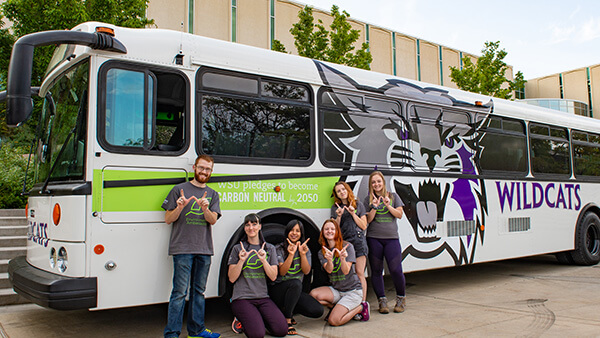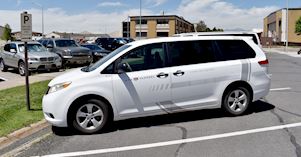Transportation

Weber State University (WSU) is working to reduce our transportation emissions by 50% by 2030, and we need your help to succeed!
Transportation accounts for the largest amount of greenhouse gas (GHG) emissions at WSU. In 2023 WSU commuters were responsible for 16,477 metric tons of GHG emissions! To address this, WSU provides you with options to help reduce your emissions and the cost of your transportation. We are always looking for ways to make your commute better!
What You Can Do
- Utilizing alternative forms of transportation (e.g. taking the bus or biking) is the best way to reduce your carbon footprint. Check out the biking, walking, and public transportation resources below.
- Consider Starting a carpool or vanpool (see resources below).
- Even if you are commuting to campus alone, there are many ways that you can reduce your emissions. Check out the emissions-reducing suggestions below for drivers.
Biking or Walking
101619 Fall Colors 07_Ben Zack Photo.jpg/(Bikes)101619 Fall Colors 07_Ben Zack Photo__300x200.jpg)
- Register your bike. It makes it easier to identify, if it is stolen.
- Also, consider registering your bike through the Bike Index. They partner with bike shops, law enforcement, and others to locate stolen bikes all over the world, and have the highest bike theft recovery rate of any bike registration service.
- Bike racks, bike lockers, and fix-it stations are located across campus. They are marked on this map.
- For additional information on commuting by bike, rain riding, gear, security, and more, check the American Bicycle League website.
Public Transportation
.jpg/080522 OGX Test Run 01 (BenZack)__300x200.jpg)
- Get your free UTA Ed Pass!
- All full time faculty, staff, and students are eligible for the UTA Ed Pass, which provides you free unlimited access to all Utah public transit, including buses, the Front Runner & Trax.
- View bus and rail schedules using the UTA Schedule Map.
- Use route planning resources to help you plan any type of commute.
- Ride the OGX! It runs between the Union Station Front Runner and WSU every 10 minutes. It is free to ride.
- Check out the Intercampus Lyft Program which offers discounted rides between campuses.
 Carpooling and Vanpooling
Carpooling and Vanpooling
- Start a carpool with your friends, and calculate how much money you can save using the Ride Share Online commute calculator.
- Use Travelwise for free today, and find others in your area interested in carpooling.
- Start a Vanpool through UTA! There are minivans which seat up to 7, and large vans that can hold 6-15 passengers. The vans include bike racks, and the option to add Wi-Fi. Group members share the costs equally. Benefits include vehicle maintenance and access to a spare van in case of an emergency. How much could you save? Contact UTA today to find out!
Reduced Emissions Driving
_edited.jpg/ElectricFleet(Analeah)_edited__300x203.jpg)
- Turn your key, be idle free! WSU is an idle-free zone. This website has additional information about how idling affects air quality.
- Park for free at the Dee Events Center, and catch the OGX to the Shepherd Union Building stop.
- Choose to drive a cleaner vehicle and receive a 20% parking permit rebate which is available for EV's, and other fuel efficient vehicles made in 2000 or newer with a Green Book Score of 46 or higher.
- Charge your electric vehicle at one of the many EV charging stations located across campus.
- Consider purchasing a Carbon Offset when you renew your parking permit! All contributions will be matched by WSU's Energy & Sustainability Office.
- Whenever possible, Skip the Trip!
- Telecommute instead. When you can, attend virtually and skip the trip. Travel Wise has good resources for information about Alternative Work Schedules.
- Participate in WSU's annual Clear the Air Challenge!
- During the winter, 50% of the trapped particulate matter in the inversions come from vehicle emissions.
- The Department of Air Quality has said that if Wasatch Front drivers were to park their vehicles for just one day per week, emissions would decrease by 6,500 tons per year. Make every trip count.
- Trip Chaining is a small, but effective change that is easy to implement! Cold engine Start-ups use twice as much fuel and pollute twice as much. A one-mile trip can produce 70% of the carbon emissions of a ten-mile drive, with several stops. Before you drive ask yourself if you really need to make this trip, or if it could be saved for later and combined with another task. Or see if there is someone you can ride with.
